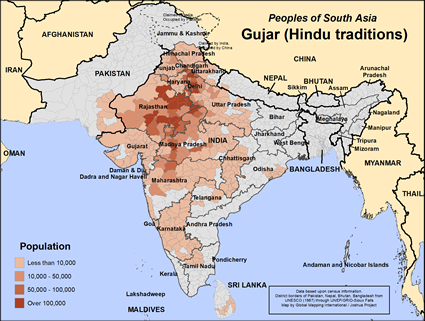Gujar in Pakistan

Photo Source:
Anonymous
|

Map Source:
People Group data: Omid. Map geography: UNESCO / GMI. Map Design: Joshua Project.
|
| People Name: | Gujar |
| Country: | Pakistan |
| 10/40 Window: | Yes |
| Population: | 17,000 |
| World Population: | 7,536,000 |
| Primary Language: | Sindhi |
| Primary Religion: | Hinduism |
| Christian Adherents: | 0.42 % |
| Evangelicals: | 0.42 % |
| Scripture: | Complete Bible |
| Ministry Resources: | Yes |
| Jesus Film: | Yes |
| Audio Recordings: | Yes |
| People Cluster: | South Asia Hindu - other |
| Affinity Bloc: | South Asian Peoples |
| Progress Level: |
|
Introduction / History
The Gujar are comprised of three very closely related people groups that are known collectively as the Gujar Rajasthani.
As various Muslim groups began invading India and Pakistan in the eleventh century, many Gujar Hindus converted to Islam. When this happened, their resentful Hindu neighbors began to rise and take control of the area. The Gujar were forced to leave the region and search for good pastures elsewhere. Their wanderings took them into Pakistan and Afghanistan, where thousands have remained until this day.
The partition of Pakistan and India in 1947 also caused many tribal migrations. Masses of Muslims immigrated to Pakistan, while the Hindus flocked to India. There are still small Hindu communities in Pakistan, including the Gujar people.
The Gujar are in Afghanistan, Pakistan, and several states in northeastern India (Himachal, Madhya Pradesh, Uttar Pradesh, Jammu, Kashmir, and Rajasthan). In addition, the Gujarat district of western India is named after the historic Gujar peoples.
What Are Their Lives Like?
Ever since their conversion to Islam in the eleventh century, the Gujar have been bound by a life of poverty, illiteracy and social oppression. In general, they are a simple, inoffensive people with a generous, hospitable nature. Today, most of the Gujar living in Pakistan live as law-abiding shepherds and farmers. Unfortunately, they are still belittled by others and often labeled as thieves and vagrants.
The Gujar are divided into hundreds of clans. Their societies are patrilineal, which means that inheritances are passed down through the males. Marriages are usually arranged by the parents, and a bride price of either cash or buffalo is paid to the girl's family. They are permitted to marry outside their clans, and young couples generally live near the grooms' parents.
All three Gujar groups speak Gujari, an Indo-Aryan language. This common factor has helped to identify them as a distinct sub-group. The Gujar of Afghanistan also speak Pashto and/or Dari, which are Persian languages (and are spoken by three-quarters of the Afghani population).
What Are Their Beliefs?
A majority of the Gujar are Hindu, but there is also a significant number of Muslims among the Gujar, as well as a smaller number of Sikhs.
Hinduism is a catch-all phrase for the local religions of South Asia, so it is very diverse. At the popular level, Hindus worship and serve the gods of the Hindu pantheon. They visit Hindu temples and offer prayers, food, flowers, and incense to their gods in hopes of gaining protection and benefits. They do not have a personal or familial relationship with their gods like Christians or Jews. There are other Hindus who are much more philosophical, especially among the Brahmins.
Almost all Hindus participate in yearly celebrations like Holi, the festival of colors and the start of spring / Diwali, the festival of lights / Navratri, the celebration of autumn / and Rama Navami, Rama's birthday.
What Are Their Needs?
The Gujar people in Pakistan have few if any chances to hear of the one who offers life to the full. How will they hear?
Prayer Points
Ask the Lord to send forth loving laborers into India, Pakistan, and Afghanistan to share Christ with the Gujar.
Pray that God will encourage the small number of Gujar believers and give them a vision to reach their own people.
Ask God to send Christian teachers to live and work among the Gujar.
Ask the Holy Spirit to soften the hearts of the Gujar so that they will be receptive to allowing Christ to abundantly bless their families and communities.